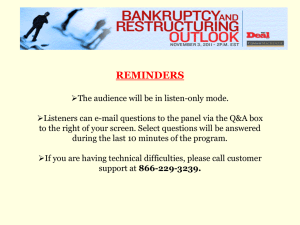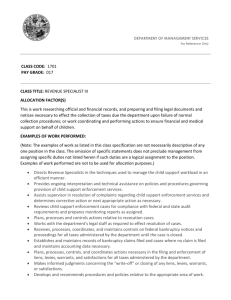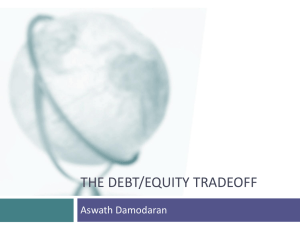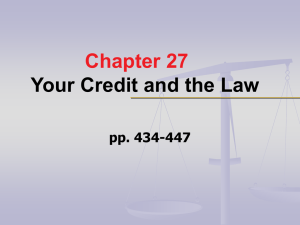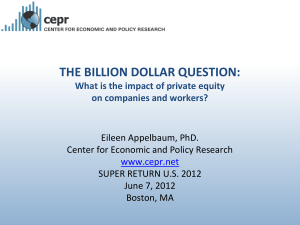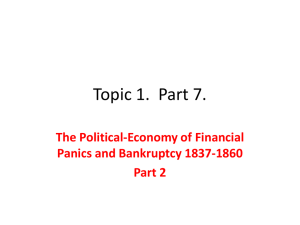now
advertisement
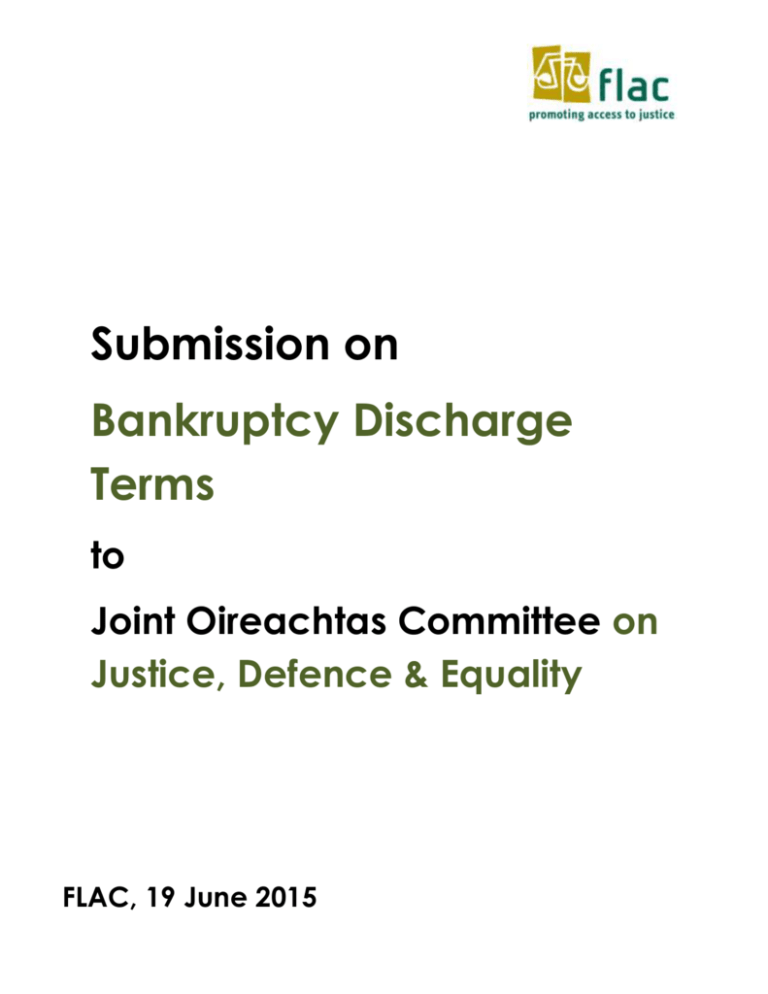
Submission on Bankruptcy Discharge Terms to Joint Oireachtas Committee on Justice, Defence & Equality FLAC, 19 June 2015 About FLAC FLAC (Free Legal Advice Centres) is a non-governmental, voluntary organisation which exists to promote the fundamental human right of access to justice. As an organisation, FLAC focuses on the use of law as a tool for social change and on the right of equal access to justice for all. We work particularly on the protection of economic, social and cultural rights. FLAC is an affiliate member of the FIDH. In our work, we identify and make policy proposals on how the law excludes marginalised and disadvantaged people, principally around social welfare law, personal debt & credit law and civil legal aid. We advance the use of law in the public interest and we co-ordinate and support the delivery of basic legal information and advice to the public for free and in confidence. FLAC Policy Towards achieving our stated aims, FLAC produces policy papers on relevant issues to ensure that government, decision-makers and other NGOs are aware of developments that may affect the lives of people in Ireland. These developments may be legislative, government policy-related or purely practice-oriented. FLAC may make recommendations to a variety of bodies drawing on its legal expertise and bringing in a social inclusion perspective. You can download/read FLAC’s policy papers at http://www.flac.ie/publications/policy.html For more information, contact us at FLAC, 13 Lower Dorset Street, Dublin 1 01-8873600 | info@flac.ie | www.flac.ie |fb.me/flacireland |@flacireland FLAC: Submission on Bankruptcy Discharge Terms (19 June 2015) ___________________________________________________________________________________________ 1. Introduction. This submission primarily relates to the discharge term for consumers and those with primarily nonbusiness debt. FLAC recognises that, for many, business and personal debt are inevitably mixed because personal assets were mortgaged or guaranteed for many business debts. We also recognise that any changes will also affect those with mainly business debt. However, as bankruptcy has become an important mechanism to deal with consumer debt cancellation, we trust that the submission will be helpful to the Committee in its consideration from a consumer perspective of whether the bankruptcy discharge period should be reduced in general from three years to one years. 2. General The discharge period in bankruptcy in any country is a matter of policy. It has evolved over time, as has the understanding of the purpose of bankruptcy. Historically, bankruptcy was a form of debt collection and a punishment to those who refused to pay their debts. However, with the recognition that credit is a core part of doing business, that thinking had to change and now modern bankruptcy laws have ‘transformed bankruptcy from a creditor initiated debt collection exercise to a debtor initiated debt relief mechanism1’. The purposes of bankruptcy were well identified in recent years, particularly by the Law Reform Commission in its seminal three papers in 2009-2010 which formed the basis for the thinking in the current Personal Insolvency Act 2012 and indeed provided the model for that legislation. Included in those purposes the Commission noted that bankruptcy now exists to assist in the protection of consumers and the capacity for a person to make a fresh start. As the American academic Professor Jason Kilborn, chairperson of the World Bank drafting group on bankruptcy reform,2 noted at a FLAC conference in 2012: Modern consumer lending practices inevitably produce casualties and that is a structural phenomenon that is here to stay in a global marketplace. Allowing thousands of debtors to remain deactivated by debilitating debt is a serious structural impediment to a maximally healthy, vibrant economy that Ireland could and should have. Arguing for a model of bankruptcy that helps get people back on their feet, he says that: 1 The Law Reform Commission’s Report on Personal Debt Management and Debt Enforcement2010 at 3.32-3.33 http://www.lawreform.ie/_fileupload/reports/r100debt.pdf. 2 http://siteresources.worldbank.org/INTGILD/Resources/WBInsolvencyOfNaturalPersonsReport_01_11_13.pdf ____________________________________________________________________________________________________________ FLAC, 13 Lower Dorset St, Dublin 1| T: 01-8745690 | W: www.flac.ie | E: info@flac.ie 1 FLAC: Submission on Bankruptcy Discharge Terms (19 June 2015) ___________________________________________________________________________________________ Any other model imposes waste and expense on every actor in the system, especially the state and its taxpayers, to subsidise creditor avarice and an irrational desire for punishment of debtors, who are not malefactors, but victims of local financing risk-taking by banks and global economic forces beyond consumers’ control and probably beyond their comprehension.3 3. The family home For many of those that contact FLAC, their unmanageable over-indebtedness arises from mortgage debt on their family homes. Some will be able to avail of insolvency arrangements - a debt settlement arrangements or a personal insolvency arrangement – but for many others these are either refused or are not suitable under the current rules. Therefore, if they are unable to restructure their debt by agreement with their lenders, and if they are unable to avail of insolvency solutions, they can expect to lose their homes. The discharge period for bankruptcy will be of most concern after they lose the house. After the house is either voluntarily sold by agreement with the lender or repossessed and sold by the lender, many are left with an overhanging debt which is the difference between what they owed the lender and what the lender received on the sale. The size of this debt will usually overshadow all other debts. For such consumers, bankruptcy is often a viable option and the discharge period is seriously significant. 4. Arguments previously made We do not propose to repeat the submission made to this Committee by the Insolvency Service of Ireland, and in particular by the Official Assignee, Mr. Chris Lehane, when he appeared before the committee on 27 May 2015. He highlighted a number of important arguments in favour and against reducing the bankruptcy term. He correctly highlighted that a reduction in the bankruptcy term may not affect a person’s capacity to retain the family home. FLAC agrees that this is the case but submits that a short discharge period may affect the negotiations which often end up in forcing the sale of the family home and may encourage 3 FLAC conference 19 Apri1 2012 Legislating for Personal Insolvency in Ireland: International Developments and Domestic Issues - A comparative consumer insolvency perspective: Key lessons from thirty years of pitfalls and best practices Prof. Jason J. Kilborn John Marshall Law School (Chicago) . http://www.flac.ie/download/pdf/kilborn_irish_reform_bill_keynote_text2.pdf FLAC: Submission on Bankruptcy Discharge Terms (19 June 2015) ___________________________________________________________________________________________ agreed write down of un-payable debt, thus avoiding sale of the family home and subsequent bankruptcy entirely. 4. Discharge term reduction and moral hazard Modern bankruptcy, seen as a debtor-initiated debt relief mechanism, should operate from an assumption that those seeking bankruptcy are acting in good faith. However, for those acting in bad faith, our legislation does provide for extension of the bankruptcy term. Section 85A of the Bankruptcy Act 1988, as inserted by Section 157 of the Personal Insolvency Act 2012, allows the Official Assignee or a creditor to apply to the court to extend the term of a bankruptcy from three to eight years in the event that the bankrupt has failed to co-operate or has failed to disclose assets. 5. Bankruptcy tourism The difference in the bankruptcy term between Ireland and the neighbouring jurisdictions of Northern Ireland and England & Wales has led to significant numbers of people leaving Ireland and establishing centres of interest and residence in those jurisdictions to avail of the shorter bankruptcy periods. This however is not available to everyone. People in a wide range of employment cannot just leave their jobs and re-settle or establish a centre of interest elsewhere. Many others have family and personal commitments in Ireland that do not allow them to move. Still more do not have the funds to do so. This then effectively discriminates against those with fewer resources and less flexible work arrangements. There is an argument that reducing the term would encourage bankruptcy tourism. It is submitted that establishing a new centre of interest is never going to be a trivial step. That removes the exercise far from one of ‘tourism’ but even if that term is accepted, then it could be said that we are exporting a problem to our neighbouring jurisdictions even now. 6. Income Payment Orders In addition to the existing three-year term, there is provision for income payment orders – currently five years. If the term of bankruptcy is reduced to one year, then it is submitted that the length of these orders should be reduced to three years – as is the position in the UK. These income payment orders can commence at any time during the bankruptcy and while it is normally envisaged that they begin with the bankruptcy period, they can in fact be made on the final day of discharge, which would extend the repayment period significantly. FLAC: Submission on Bankruptcy Discharge Terms (19 June 2015) ___________________________________________________________________________________________ 7. EU Best Practice proposals In the Final Report of London Economics, prepared for the European Commission, A Study on means to protect consumers in financial difficulty4 Section 6.1.2 provides a summary of best practice. It proposes as best practice for the EU in consumer debt cancellation that: ‘As in Denmark and the UK, discharge should occur one year into a three year payment plan, aligning discharge at the lowest common denominator whilst still ensuring creditors have access to excess earnings for three years’ 8. Stigma The same study also calls for the ending of the pejorative term of bankruptcy to be repalaced by the more neutral ‘debt-adjustment’. This brings us to the final reason why the Committee might want to recommend reduction of the bankruptcy term. Whether it should be the case or not, those we meet in FLAC will often still feel a sense of shame – although many will work their way through to recognition that what is happening is simply dealing with their debt. For consumers, unexpectedly faced with massive, unexpected over-indebtedness, the threeyear term of being bankrupt is a long one and the label and connotation of bankruptcy can be a heavy burden for them and their families to face. FLAC is happy to furnish any further information or comment to the Committee or its members as might be requested. Noeline Blackwell and Paul Joyce FLAC 19 June 2015 4 December 2012.

